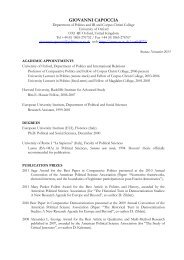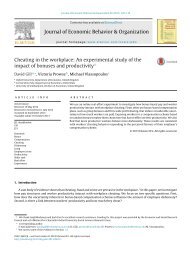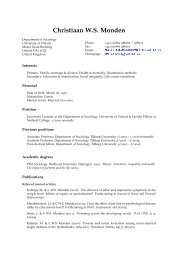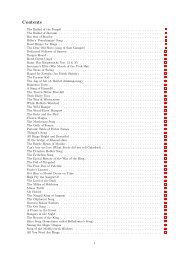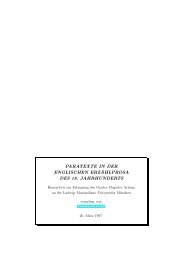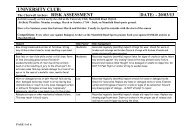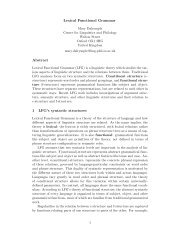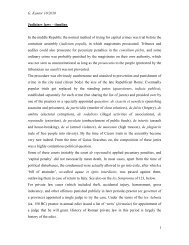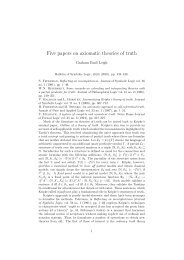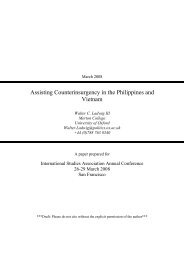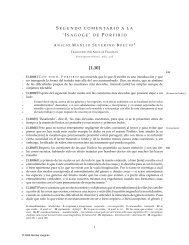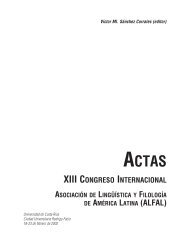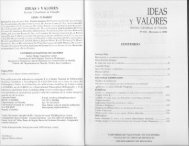Gilbert Ryle, archetypical Oxford tutor - Personal Pages Index
Gilbert Ryle, archetypical Oxford tutor - Personal Pages Index
Gilbert Ryle, archetypical Oxford tutor - Personal Pages Index
You also want an ePaper? Increase the reach of your titles
YUMPU automatically turns print PDFs into web optimized ePapers that Google loves.
<strong>Gilbert</strong> <strong>Ryle</strong>, <strong>archetypical</strong> <strong>Oxford</strong> <strong>tutor</strong><br />
john lucas<br />
The University has been asked by the Government to say<br />
what its strategy is. The answer is simple: the University<br />
does not have a strategy. Strategies are for armies, where<br />
it is essential that all activities are coordinated; universities<br />
are not armies, and seek to foster creativity rather<br />
than uniformity, and so should not have strategies. Full<br />
stop. End of reply.<br />
But that is too quick. Although it is a fair riposte to<br />
an ill-considered demand by the Government, there are<br />
challenges facing the University and <strong>Oxford</strong> generally<br />
(using Lord Franks’ useful terminology, where `<strong>Oxford</strong>’<br />
includes not only the University and the Colleges, but all<br />
its individual members and the whole set up). Throughout<br />
its history <strong>Oxford</strong> has faced challenges, and has<br />
coped with them in its own arrangements and by the face<br />
it has shown to the outside world. It is worth surveying<br />
some of these, using a very broad brush, masking the<br />
inevitable inaccuracies and many omissions.<br />
In the 1970s I was nosing through the papers for<br />
the British Association’s meeting in <strong>Oxford</strong> in 1860.<br />
“<strong>Oxford</strong> was the coming place for science’’ I read,<br />
expressed in almost the same terms as were being used<br />
to push the same message in the 1970s. The enthusiasm<br />
in 1860 was in part the result of an earlier tussle between<br />
Benjamin Jowett, the Master of Balliol, and Mark Pattison,<br />
the Rector of Lincoln. Pattison wanted to ease<br />
<strong>Oxford</strong> and Cambridge out of their isolation from the<br />
vigorous intellectual life of universities in Europe. In the<br />
end he lost out. The agricultural depression of the late<br />
nineteenth century left the Colleges very short of funds,<br />
and unable to support expensive experiments. Although<br />
good work was done in the Balliol and Trinity laboratory,<br />
chemistry was too costly to be undertaken by Colleges<br />
dependent on endowments, and it was only after<br />
we nearly lost the First World War through our lack of<br />
chemical expertise that the taxpayer provided the University<br />
with enough money to do it properly.<br />
In any case in 1860 chemistry was not the key science.<br />
The key science was geology, which was revealing<br />
the antiquity of the world, and might tell us whether we<br />
were fallen angels or risen chimps. Geology continued to<br />
be taught at <strong>Oxford</strong>, and I inherited my father’s grounding<br />
in it as a little boy, and discovered myself to be a Cretacious<br />
man, finding chalk landscapes the most beautiful,<br />
and being indignant at a take-over bid for the Weald<br />
by the Jurassicists. But, living in the 1930s, I caught<br />
chemistry from the spirit of the age, and spent my pocket<br />
money on potassium nitrate and trying to acquire cobalt<br />
chloride; and later earned much respect from my school<br />
mates when after mixing iodine and ammonia during<br />
a break between lessons, and having to throw it out of<br />
the window on the master’s return, the nitrogen iodide<br />
exploded convincingly while we were being taught the<br />
murkier tenses of Greek verbs. I had loved chemistry too<br />
late. It was being torn asunder by biology and physics.<br />
On the one hand, covalence and ions called for explanation,<br />
and on the other, the questions organic chemists<br />
should be answering were questions set by the biologists.<br />
When in my last year at school I asked my chemistry<br />
master why it was that the periods in the Periodic Table<br />
had entries that fitted the formula 2 times n squared,<br />
he had no answer, and I realised I must learn quantum<br />
mechanics in order to know the answer. Harwell and<br />
Culham are where earth-shaking research is now done,<br />
and a new sort of biology, genetics, depending more on<br />
information theory that biochemistry is illuminating our<br />
understanding of life.<br />
Financial stringency tipped the balance in favour of<br />
Jowett. A rising generation of prosperous professionals<br />
wanted to educate their sons properly, and an empire<br />
needed well-educated administrators to run it. Colleges<br />
put up new buildings to house the influx of fee-paying<br />
pupils, and <strong>tutor</strong>s came to dominate the <strong>Oxford</strong> scene. It<br />
is unfair to describe Jowett’s <strong>Oxford</strong> as a Seventh Form<br />
Finishing School, but the criticism has point. The picture<br />
of the hard-working teacher – Tom Brown Stevens<br />
of Magdalen was reputed to conduct thirty six <strong>tutor</strong>ials<br />
a week – who spent his afternoons cheering the College<br />
team, except on Tuesdays, when he would attend Congregation<br />
to make sure Hebdomadal Council was doing<br />
nothing untoward, ignores a lot of serious intellectual<br />
effort. But when I, as a new <strong>tutor</strong> at Merton, suggested<br />
that the College should provide typing, I was met with<br />
much misunderstanding of what Colleges were for. I<br />
was, the Warden said, seeking to increase the Fellows’<br />
perks; it would be like our having free breakfasts. At<br />
length it was agreed that we could get correspondence on<br />
College business typed, but the Senior Tutor protested<br />
vigorously that “private work” ought to be at our own<br />
expense. Tutors might engage in intellectual enquiry, but<br />
it was not part of the job.<br />
Many <strong>tutor</strong>s did. The paradigm was <strong>Gilbert</strong> <strong>Ryle</strong>.<br />
He was an arch-<strong>tutor</strong>, totally in tune with undergraduates.<br />
When freshmen arrived at Christ Church, he could<br />
tell from their opening remarks not only which school<br />
they came from, but which house. But he also had read<br />
widely – even authors in contemporary Europe – and he<br />
wrote, while being slowly demobilised from the Intelligence<br />
Corps, the work he later published at the landmark<br />
“Concept of Mind”. It was the perfect expression<br />
of his intellectual character. It put forward a version of<br />
logical behaviourism, in which personality was completely<br />
constituted by what a person did. He was a great<br />
admirer of Jane Austin (and used to tell critics who wondered<br />
if he ever read novels that he had indeed read all six<br />
of them), and relished her delicate delineation of character<br />
in what was actually done and said.<br />
But the characters he understood were ex-schoolboys<br />
– as undergraduates we sometimes would wonder<br />
what various <strong>Oxford</strong> philosophers would have been<br />
if they had not been dons, and were agreed that <strong>Ryle</strong><br />
would have been a housemaster at a leading public<br />
school – whose athletic activities manifested their minds,<br />
which were chiefly located in their legs; whereas the artisan<br />
in the ancient world had worried lest his right hand<br />
should lose its cunning, <strong>Ryle</strong> rejoiced in the mental abilities<br />
of ankles. He had no time for the Inner Life, and his<br />
exclusively external account was wittily lampooned by
Iris Murdoch. The Concept of Mind gave a reasoned refutation<br />
of the extreme Cartesian dualism that had held<br />
sway, and was an important contribution to philosophy.<br />
<strong>Ryle</strong> was elected to the Waynflete chair. It was a good<br />
choice on the part of the electors, but an unwise move for<br />
him. He wanted to teach, and needed pupils. Realising<br />
the unsuitability of the thesis-oriented D.Phil., he instituted<br />
a B.Phil., taught and examined like a Tripos Part III<br />
in Cambridge, and recruited many, particularly Australians,<br />
to read it. But they were not undergraduates, and<br />
did not have involvements in College life that undergraduates<br />
had. So he gave weekly “informal instruction’’ to<br />
undergraduates, and in our final year Bernard Williams<br />
and I attended. The informal instruction was good, but<br />
before it could begin, we had to report on JCR affairs.<br />
<strong>Ryle</strong> was agog to hear the latest instalment of the<br />
saga of the JCR cat. Marcus, as he was then called, had<br />
begun to wander, and each morning there would be a<br />
call from some other College, and the JCR boy had to go<br />
round and retrieve him. It was thought that Marcus’ bad<br />
behaviour was caused by a superfluity of hormones, and<br />
the JCR committee had discussed surgical intervention,<br />
which was favoured by the President, who was reading<br />
medicine, but was aware of resistance by some members<br />
of the JCR. But time was running short, and soon an<br />
anaesthetic would be required. One member of the JCR<br />
was outraged when, on fondling Marcus, he discovered<br />
that the operation had been carried out, and his outage<br />
was shared by many others who had a strong sense of the<br />
Human Rights of cats, and an emergency meeting was<br />
called to pass a motion of censure on the President.<br />
Unfortunately, or perhaps fortunately, he had a <strong>tutor</strong>ial<br />
at the time, and I had to chair the meeting. Bernard<br />
was Treasurer. Things were hotting up. And then Bernard<br />
went to the wall and took down the copy of the<br />
rules, and in a confident tone read out a completely<br />
imaginary rule giving the Committee sweeping powers<br />
to act in an emergency. It worked. I managed to hide<br />
my surprise and soon was able to move from the chair a<br />
pacificatory motion that the cat should be renamed Abelard,<br />
which was duly done after Hall by the ex-President,<br />
an intending ordinand with a good voice.<br />
<strong>Ryle</strong> was refreshed by his weekly contact with the<br />
real world. And Bernard and I benefited greatly from his<br />
informal instruction.



